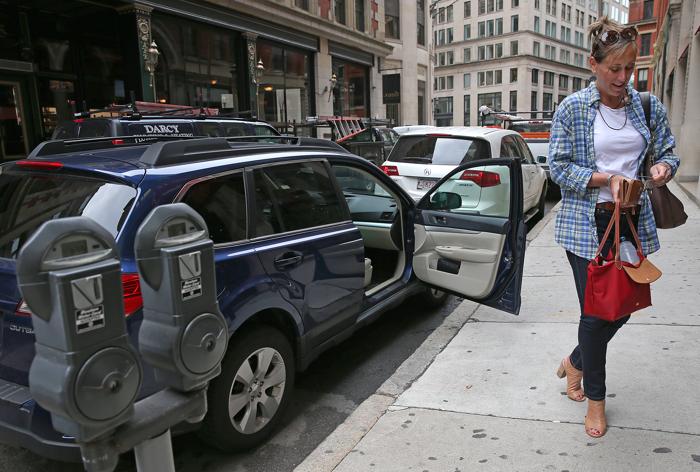Boston drivers, stereotype has it, aren’t the kindest.
So imagine the first time such a stereotypical driver, who has been puttering around a neighborhood looking for a spot for 20 minutes, sees another driver ready to leave his spot deliberately holding it for a specific car.
It wouldn’t be pretty. But it might happen soon. Haystack, an app that lets parked drivers “sell” their spots to nearby users, is expanding into Boston this week. It was launched in Maryland earlier this year.
The description of the app reads like a quick brainstorm of a woebegone driver looking for a spot, and the idea loses its luster pretty quickly. It allows users parked in public spaces—which they don’t own—to put their spot up for “sale,” and other users to see where those spots are. If they are nearby, the searching drivers (who are probably facedown in their smartphone while driving—especially if they want to use the in-app chat function) can pay a few bucks to park there. Haystack takes a cut of the sale.
Parked users sit in their car until the purchasing users show up (how efficient!). Or they can list their space when they’re paying their bill at the restaurant, the app’s site advises, so that when they get to their car the other user is perfectly double-parked while waiting for them to arrive. Horns, they’ll be a-honkin’.
Mayor Martin Walsh’s administration isn’t too keen on the idea, The Boston Globe reports. Spokesperson Kate Norton said:
“We encourage innovation, particularly relative to addressing our transportation challenges in Boston,” said Kate Norton, a spokeswoman for Walsh. “Services like Haystack, however, artificially inflate the cost of parking and allow individuals to profit from public space. Neither of these activities are in line with the city’s effort to keep parking as open and publicly accessible as possible.”
And The Boston Herald reports that city attorneys are working to determine whether or not apps like Haystack are legal.
Haystack’s 24-year-old CEO Eric Meyer says users aren’t selling parking spaces, just information about parking vacancies. But much like the notion for the app itself, that logic falls apart pretty quickly, too. As The Globe’s Callum Borchers points out:
“Haystack users don’t pay up until they actually get a parking spot. GPS technology and vehicle descriptions help two drivers meet at a space. One leaves, the other parks, and both must confirm the swap. Oftentimes the seller will remain in a space several minutes longer than necessary, preventing others from taking it, until the buyer arrives.
It is the exchange of access to the parking space–not merely the exchange of information–that triggers the transaction.”
Oh, parking in Boston sucks—no questions there. But this seems a lot more like a tech money grab to capitalize on that sad fact of life than it does a solution.
The author
Adam can be reached at adam.vaccaro@globe.com. Follow him on Twitter at @adamtvaccaro.








Leave a Reply
You must be logged in to post a comment.